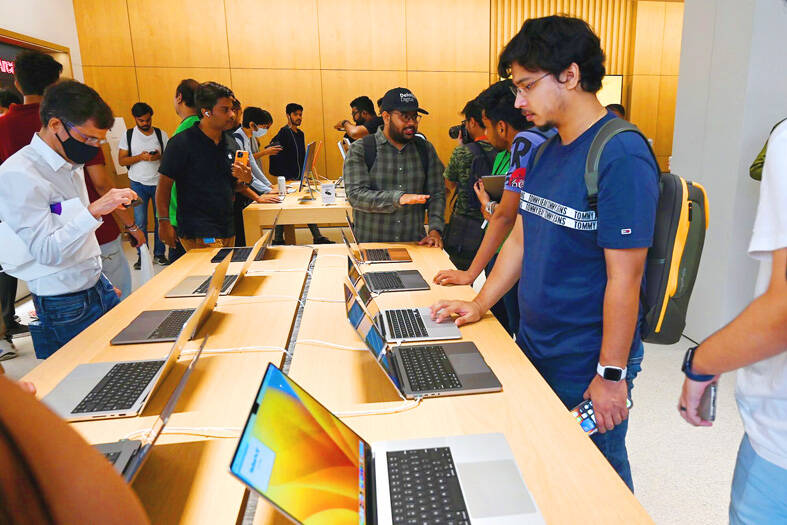India on Friday backtracked on its sudden plan to curb laptop and tablet imports without a license, giving companies three months to secure the permits.
The move came after tech giants Apple Inc, Samsung Electronics Co and HP Inc froze new device imports to the South Asian country following an abrupt order on Thursday.
India’s trade regulator surprised the world’s biggest PC makers when it made licenses mandatory for imports of electronics from small tablets to all-in-one PCs.

Photo: Bloomberg
The sudden licensing imposition caught the industry off-guard, forcing it to begin emergency engagements with New Delhi about how to quickly obtain licenses at a period of heightened consumer interest with India’s Diwali shopping season and back-to-school period approaching.
However, on Friday, India’s Directorate General of Foreign Trade (DGFT) issued a new order saying companies can import electronic goods such as laptops, tablets and other PCs without a license until Oct. 31.
The new curbs, which require a license to import these devices, will take effect on Nov. 1, the DGFT said in a notification.
New Delhi is simplifying the process of applying for licenses, which can be approved in as little as a day, a senior government official told reporters earlier on Friday.
Officials are also helping companies for the clearance of shipments already in transit to the South Asian nation as the halt threatens to disrupt a multibillion-dollar trade in foreign PCs at a crucial time.
The requirement creates additional compliance headaches for manufacturers in a market that is still largely reliant on overseas shipments.
It is also part of a wider state push to boost local production and create a world-class tech manufacturing industry in India. Indian Prime Minister Narendra Modi’s government is seeking applications for a 170 billion-rupee (US$2.1 billion) financial incentive plan to draw makers of laptops, tablets and other hardware to the world’s most populous nation as companies look to diversify supply chains beyond China.

Vincent Wei led fellow Singaporean farmers around an empty Malaysian plot, laying out plans for a greenhouse and rows of leafy vegetables. What he pitched was not just space for crops, but a lifeline for growers struggling to make ends meet in a city-state with high prices and little vacant land. The future agriculture hub is part of a joint special economic zone launched last year by the two neighbors, expected to cost US$123 million and produce 10,000 tonnes of fresh produce annually. It is attracting Singaporean farmers with promises of cheaper land, labor and energy just over the border.

US actor Matthew McConaughey has filed recordings of his image and voice with US patent authorities to protect them from unauthorized usage by artificial intelligence (AI) platforms, a representative said earlier this week. Several video clips and audio recordings were registered by the commercial arm of the Just Keep Livin’ Foundation, a non-profit created by the Oscar-winning actor and his wife, Camila, according to the US Patent and Trademark Office database. Many artists are increasingly concerned about the uncontrolled use of their image via generative AI since the rollout of ChatGPT and other AI-powered tools. Several US states have adopted

A proposed billionaires’ tax in California has ignited a political uproar in Silicon Valley, with tech titans threatening to leave the state while California Governor Gavin Newsom of the Democratic Party maneuvers to defeat a levy that he fears would lead to an exodus of wealth. A technology mecca, California has more billionaires than any other US state — a few hundred, by some estimates. About half its personal income tax revenue, a financial backbone in the nearly US$350 billion budget, comes from the top 1 percent of earners. A large healthcare union is attempting to place a proposal before

KEEPING UP: The acquisition of a cleanroom in Taiwan would enable Micron to increase production in a market where demand continues to outpace supply, a Micron official said Micron Technology Inc has signed a letter of intent to buy a fabrication site in Taiwan from Powerchip Semiconductor Manufacturing Corp (力積電) for US$1.8 billion to expand its production of memory chips. Micron would take control of the P5 site in Miaoli County’s Tongluo Township (銅鑼) and plans to ramp up DRAM production in phases after the transaction closes in the second quarter, the company said in a statement on Saturday. The acquisition includes an existing 12 inch fab cleanroom of 27,871m2 and would further position Micron to address growing global demand for memory solutions, the company said. Micron expects the transaction to